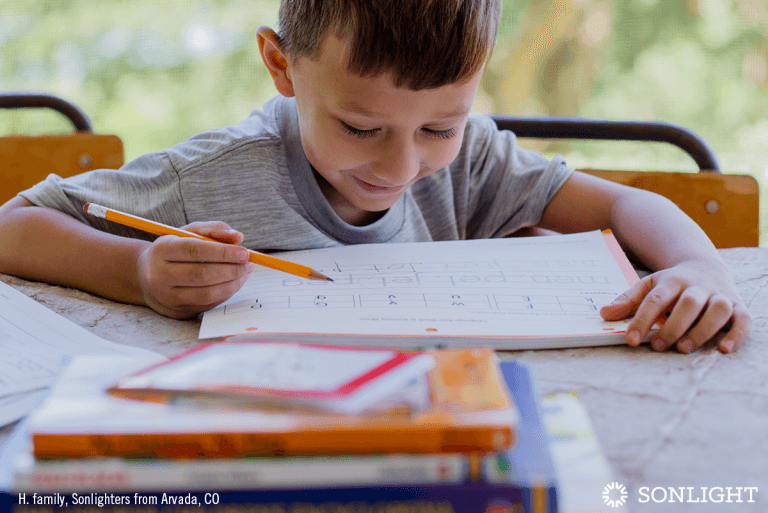
Children are normally full of adventure and fun. They love to experiment and are naturally curious. But some children break from that norm. They prefer life to be neat, clean, and linear. These are the young perfectionists who prefer to spend an hour organizing their art kit crayons by color rather than playing in the messy outdoors. They cry when they make a mistake, no matter how inadvertent, and don’t like to try anything new unless they can do it perfectly the first time.
Homeschooling young perfectionists may sound easy. They want to be the best at everything, whether it be completing a worksheet or a reading a book. They put a lot of effort into doing a good job, and they don’t want to just do a halfway job at anything. Sounds like a teacher-mom's dream, right?
Wrong. Any parent of a mini-perfectionist can tell you it is not easy. These parents spend hours struggling with the anguish of children who can't handle making mistakes:
- a child who cries because of writing the letter S backwards or writing 3 when the answer is 4
- a child who refuses to do a worksheet at all, out of fear each answer won’t be perfect
- a child who declares he is incapable of reading after making two mistakes sounding out words on the same page
- a child who beats herself up for not coming in first
- a child who refuses to complete the board game when it appears halfway through that he is losing
Homeschooling these children is especially challenging because there is no room for medium in their little minds. It is all or nothing:
- If they can’t do the worksheet perfectly, there is no need to do it at all.
- If they aren’t the best in the class at gymnastics on the first day, there’s really no point in going back.
A lot of the time, this trait comes along with giftedness, as these children have never had to work hard at much in their young lives. Everything always came easily, so they assume that everything always will, and everything always should.
For parents who are struggling to teach these types of children, here are 10 tips I have picked up on my journey of homeschooling a family full of perfectionists.
1. Play Guessing Games with Your Perfectionist
Guessing games are good for perfectionists because they come without the expectation of getting the answer right on the first try.
Say, “Okay, we’re going to play Guess the Answer to these math problems. I don’t think you can get them all, but let’s see what you can do.”
Include a few harder problems that force them to struggle to get the right answer. When they get an answer wrong, don’t criticize or tell them they were wrong. Be encouraging, and act like it is part of the game. Say, “Oooh, pretty close. Try again.” or “That was a good guess. But, you’re still not there yet. Let’s keep trying.”
Taking the pressure off them to be right by expecting them to be wrong gives them permission to be wrong—without guilt.
2. Blame the Assignment, Not the Perfectionist
Perfectionists often fear that if people discover they are imperfect, something negative will happen, such as being thought poorly of or being unliked. By blaming the assignment, rather than the child, the child focuses on the mistake, not their role in the mistake.
Say, “Oh, this assignment is going to be very hard. I’m bet you will make 5 mistakes before you get it right because it’s so hard.”
Then, if they make fewer than 5 mistakes, they exceeded the expectation you set.
3. Blame the Object, Not the Perfectionist
When a child is doing a task without success, don’t tell the child he is doing it wrong.
Say, “Oh, that pencil is trying to jump into your hand in the wrong position. Let’s see if together we can make that pencil stand up in your fingers the way it is supposed to.”
Or say, “I see you wiped down the table well, but it looks like some crumbs jumped back onto this side of the table when you weren’t looking. Let’s wipe them up.”
Your perfectionist knows he was the one who made the mistake, but because you focused the attention on the object, the child is usually happy to fix the object’s mistake, rather than dissolve into tears at the thought of their mistake.
4. Play Letter Police or Number Inspector During Homeschool Lessons
This trick is especially helpful for twice exceptional children, especially those with dyslexia, or those who are prone to letter reversals or other simple mistakes. The premise of the game is simple. The child does an assignment. Then, together with the parent, the child is in charge of finding letters, numbers, or mistakes that didn’t obey the rules. Here are examples of what you can say:
- “Look at that s. It tried to go the wrong way around! Let’s fix it up and make it go around the right way.”
- “These numbers are being tricky. I don’t think you can guess what’s wrong with this number 4. He’s trying to do something he’s not supposed to.”
- “This word jumped really close to the next word. Let’s make him move over and give the other word a bit of space, okay?”
- “I think some of the letter on this page tried to trick you by going backwards. Let’s see how many of these tricky letters you can find and make the right way before I grade it.”
When they find and correct a mistake, say. “I love the way you straightened that letter out. He’s so sneaky. He almost got away with that. Good thing you are here to inspect them.”
5. Set Realistic Expectations for Your Perfectionist
When trying a new activity, set a realistic expectation. Make it clear that your young perfectionist will not be the best and that your only requirement is that they try, not that they win.
Say, “We are going to the park today to join another family to play soccer. Soccer is a really hard game, and everyone works together to score goals. I know you don’t want to play, but our rule is, we have to try new things before we can say we don’t like them. So, when they start playing, I’ll set my timer for 20 minutes. If you don’t like it after 20 minutes, you don’t have to play anymore.”
Usually, by the 20-minute mark, a perfectionist is either so frustrated, they are happy to quit, or having so much fun they want to continue.
The same strategy works with school work. Say, “We are going to read a new book today. It has 20 chapters. We are going to read all the way to chapter 7, a chapter a day. After chapter 7, if you don’t like this book, you can remind me, and we will talk about continuing. But, we have to give it a chance before we decide to give it up.”
6. Don't Let The Perfectionist Win
When playing games with a perfectionist, it is important not to let them win most of the time. Instead, praise them for losing well throughout the whole game.
Say, “Oh, look, my piece just passed yours. And, you did a great job just letting him go by. I see you are maturing, and I’m proud of you.”
Or say, “I really like how you are playing so well. I think you’ll have to try extra hard to catch up, but you might be able to do it.”
When they do lose, even if they are upset, find a way to praise their persistence, their effort, or any improvement since the last time.
7. Stay Positive with Your Perfectionist
When teaching reading, especially with a dyslexic perfectionist, it is important to be positive. Keep in mind the “don’t blame the child, blame the work” attitude.
Warn your young perfectionist, "This is a very tricky word. I’m going to guess it will make you say the wrong word. Look carefully and see if you can figure out what the right word is, or if it will trick you.”
By focusing on the way the words are being silly, or being tricky, your child feels more comfortable figuring out the letter’s pranks, than just reading and making mistakes. Here are two more examples:
- “You almost guessed the right word, but this last part here managed to make you say the wrong thing. Let’s look at the word slowly, and then try it again. Maybe this time, it won’t be able to trick you.”
- “This letter is extra tricky, because it doesn’t talk here. It is just silent. Let’s pretend it doesn’t exist, and try that word again.”
8. Cultivate a Growth Mindset During Homeschool Lessons
Praise the effort, not the finished work. When your child hands you a perfect paper, don’t gush over the perfection of it. Instead, gush over the effort they put into it.
Say, “Oh, wow, it looks like you tried extra hard on this paper. I can see how carefully you made your numbers, and it looks like you were able to concentrate well on getting the right answers. Thank you for working so hard on this. I think it was a beautiful job.”
By focusing on the effort, you avoid them thinking that what you wanted was the finished product. Later, when a page wasn’t perfect, you can still praise the effort and minimize the effect of the mistakes on the child.
9. Be Open About Failure and Errors
Show your young perfectionist examples of your failure and talk about them in a matter of fact way.
Say, “Oh, look, I was making this shopping list, and I spelled this word wrong. That’s okay. I’ll just cross it off and write the right word.”
Or say, “I’m sorry I didn’t listen to you carefully enough when you were trying to explain that. I will try harder to listen better. Can you start over, so I can understand you?”
By showing your child that even adults make mistakes, you are showing that making mistakes is a part of life, and showing them how to deal with the mistakes.
10. Pray with Your Perfectionist
Teach your perfectionist to pray before attempting something hard—not to pray for perfection but asking God to give them the desire to keep trying when things get hard. Teach them to pray to learn how to handle disappointments and losses, and to show God’s love to others by keeping a good attitude. By doing this, you are teaching your child that the effort is far more important than winning or losing.
Things will always be hard with little perfectionists, but by taking the focus off of their mistakes and shining it on their efforts, you can circumvent many daily meltdowns. And by doing so, you show them that God wants their effort and love, not their perfection.
Take advantage of our 100% guarantee. No other homeschooling company can match our Love to Learn, Love to Teach™ promise. You can order with confidence that either you will have a great year, or you will get a full refund.









Just attempted one of our very first sit-down worksheet type activities with my 3 year old on pencil control and realised we definitely have a perfectionist on our hands! Simply googled 'homeschooling a perfectionist' and was led here and it was so helpful!!! Just want to be equipped better from the start of our journey and know I'll be referring back here often! Thank you and Praise the Lord!